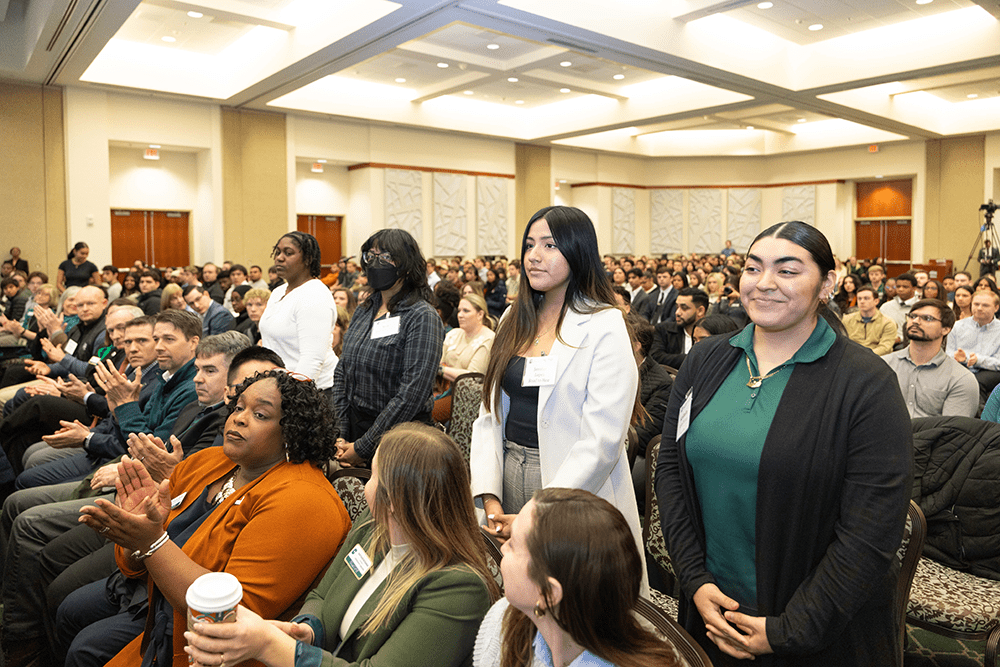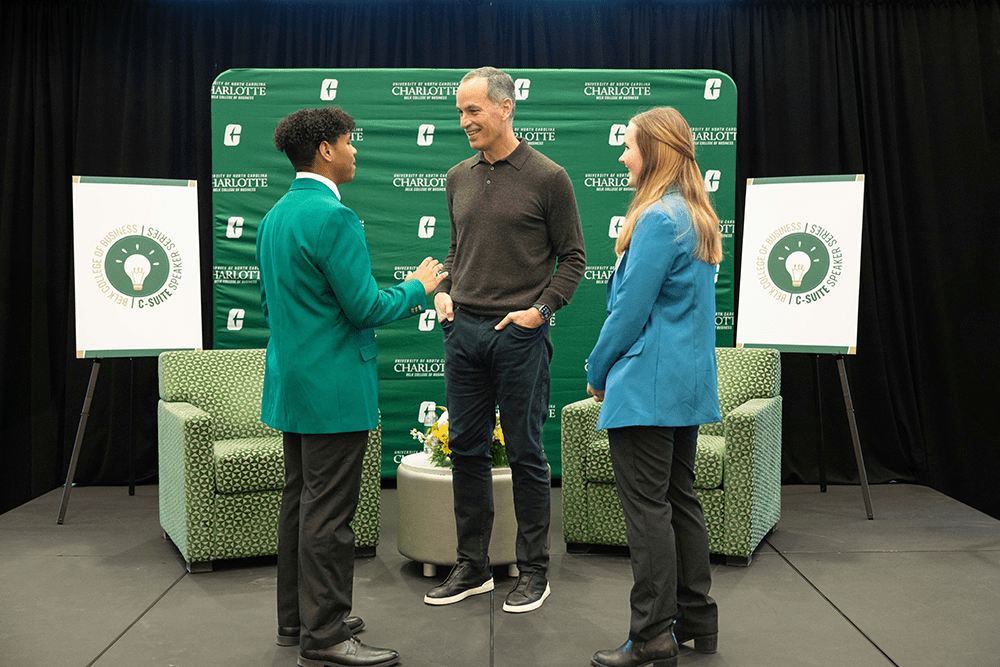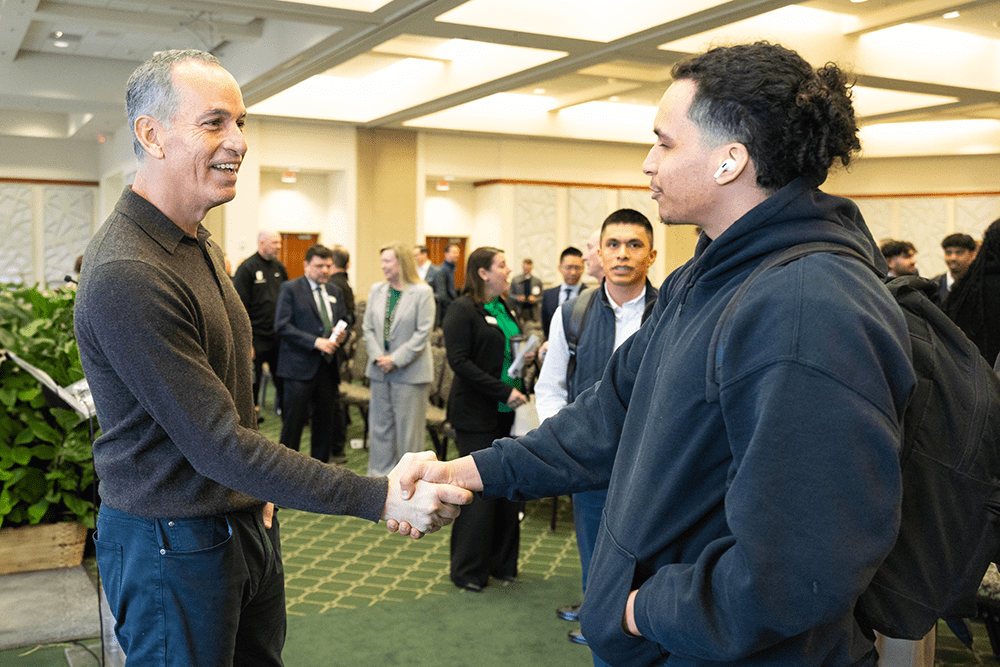Red Ventures CEO encourages students to shape their own stories
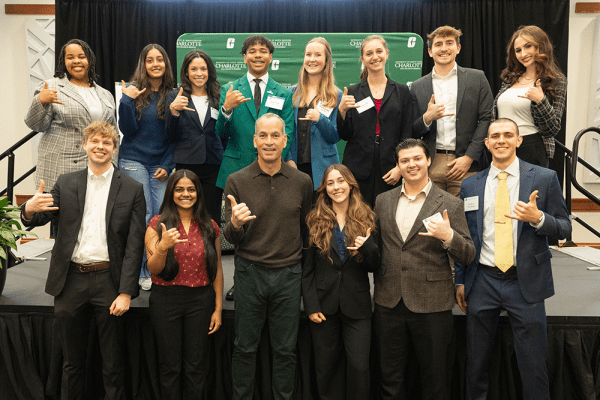
Belk College C-Suite Speaker Series draws largest crowd ever
Red Ventures co-founder and CEO Ric Elias called himself “the accidental CEO” as he talked with UNC Charlotte students at the Belk College of Business C-Suite Speaker Series on Feb. 11, 2025.
“There’s zero chance I should be sitting here if you saw how I grew up and my journey,” Elias said. Yet, here he sat in the Popp Martin Student Union, telling his story to hundreds of students in an informal chat with Belk College Dean Richard Buttimer. The talk drew the largest audience in the 10-year history of the series, including University and Belk College leaders in addition to students from across campus.
A native of Puerto Rico, Elias graduated from Boston College and earned an MBA from Harvard Business School. He co-founded RV in 2000, mere months before the dot-com bubble burst. The company weathered the financial storm and is now a diverse portfolio of brands and businesses that help millions of people make life’s most important decisions.
“From his humble beginnings growing up in Puerto Rico, to surviving a harrowing near disaster known as the Miracle on the Hudson, Ric is one of the most interesting people you’ll ever meet,” said Chancellor Sharon L. Gaber, introducing Elias. “He also happens to be a genuinely nice guy. Ric has a heart for helping others and has been incredibly generous in supporting humanitarian efforts and establishing nonprofits that have created economic mobility for thousands of young people.”
Taking responsibility
Elias’s higher education path mirrored that of many Charlotte students, with demands on his time and his resilience — and a need to stitch together a patchwork of funding to pay for his studies. Scholarships covered one-third of undergraduate expenses, while his father paid one-third, and student loans made up the final one-third.
“It helped that I had to work 25 hours a week while I was in college,” he said. “It helped that I had student loans when I graduated, and it helped that my dad was helping me. I was given a chance to feel responsibility really early on and commitment to what that journey was.”
Following Boston College, he landed a role with General Electric. “They had a training program similar to what we do in Red Ventures, and they had an assignment in Tokyo,” he said. “So, at 23, barely knowing English, I ended up moving to Tokyo for six months.”
Once there, he volunteered to help the company’s leader in Tokyo with paperwork, getting up every morning at 5 a.m. to fax documents to the United States because of the time difference. Elias’s humility and hard work led to a permanent position and a recommendation letter on his behalf to Harvard Business School.
“No job has ever been below me,” he said. “When I was in college, I was a limo driver. At night I hustled; I worked parking security. Nothing in life is beneath me. Life is about taking whatever opportunity comes, sometimes not knowing what life’s going to bring, doing your very best, and then life will bounce your way.”
His time at Harvard Business School was intimidating, especially in early days. “This is all the elite people, and I still wasn’t confident in my English,” he said. “I still struggled to read at a pace. And at Harvard, 10% of the class fails. So, you walk in and it’s a forced curve.”
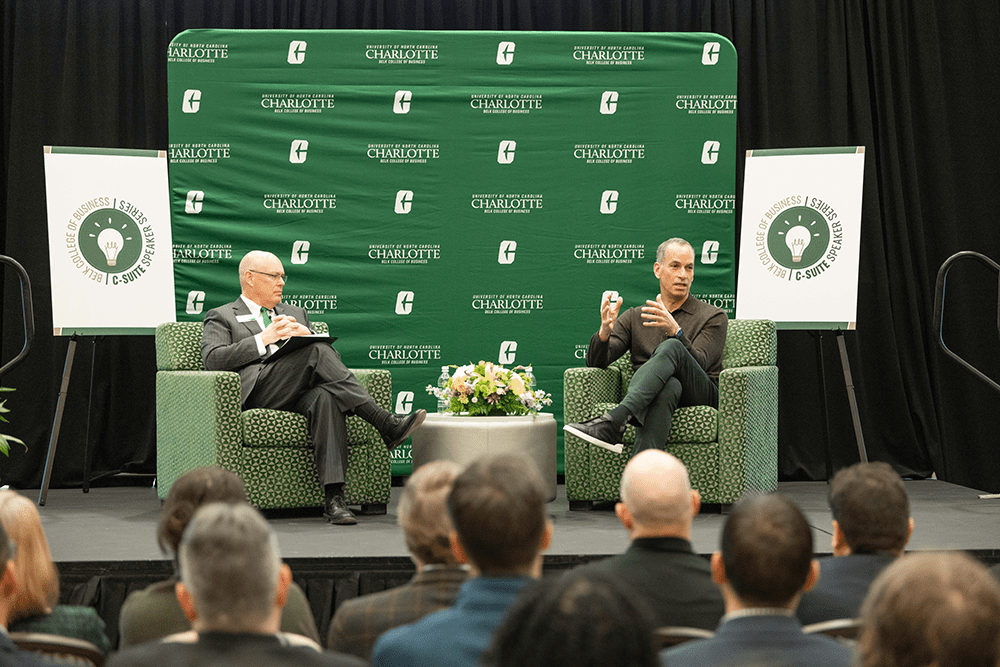
Finding confidence
As he gazed around his first class of about 90 people, he tried to figure out where he stacked up against others in the room. After about two weeks, he decided that while he probably wasn’t in the top 10%, neither was he in the bottom 10%. “I was able to relax, and I was able to do my work,” he said. “It was a ton of work. It was hard. It was challenging. But, you know, I did something that a lot of people didn’t do there, which is make a ton of friends. And that has always been my approach. We all trade our time for something. At the end of the day, that’s what life is about.”
Elias’ leadership style, with a deep commitment to people and innovation, has continued to draw attention. In 2011, he was named an Ernst & Young National Entrepreneur of the Year, and in 2016 he was inducted into the Carolinas Entrepreneur Hall of Fame. With an award-winning company culture, RV, at one time, ranked as one of Charlotte’s “Best Places to Work” for 10 years in a row.
“I think culture is probably one of the least used tools we have as leaders to create a work environment,” Elias told the Charlotte crowd. “If you think about it, if a leader is thoughtful and sets up a culture in an organization, that culture is going to lead all the behaviors. And, the culture is going to form with or without you.”
Culture is not what leaders of an organization or company declare it to be, he observed. “Culture is not what you write on a piece of paper or on a wall,” he said. “Culture is what you model and the things you reward and all of that.”
Through the years, Elias has learned that the narratives we tell ourselves shape our lives.
“I think the story in our heads, it’s a super important thing,” he said, gazing around the room to make eye contact with students. “All of us go through things in life. How you articulate that story to yourself first and foremost — and then to the world — ultimately defines if you are somebody who is leaning into the future, or are you carrying the past with you?”
Running the race
Life is not really about pitting ourselves against others, he said. He learned that lesson at Harvard Business School in some of those first classes, and in the early days of co-founding RV.
“It’s really good when you actually show up in life and you realize that the only race that matters is against yourself,” he said. “And when you view life through that lens and it’s yourself today versus yourself tomorrow, can you get a little better? I think of all the challenges that I’ve had, and I have plenty like everybody here does. I’m been super grateful for the real challenges that I’ve had.”
In one life-changing test of resilience, when Elias and Dan Feldstein founded RV 25 years ago, they raised $2 million from friends and their own cash. Not long after, they had burned through the funds and had just $177,000 remaining.
“And we had zero revenue,” Elias said. “We literally said, ‘Oh my goodness, we have no business.’ It was at that moment that we knew we had to reboot and start again. A lot of our humility as a company comes from those early days of really struggling. And I’ve always believed that our biggest challenges ultimately become the story by which we elevate ourselves. And that’s what we did as a company.”
A humble approach, and the challenges that have come their way, have shaped his personal and the company’s commitment to giving back.
Building opportunity
He is passionate about creating economic opportunity for young adults who are motivated to succeed, founding nonprofits that have supported thousands of young people on their paths to high-earning careers. One is the Road to Hire program, connecting young adults with paid tech training, scholarships and career opportunities. UNC Charlotte has 112 Road to Hire students enrolled this spring, with several attending the C-Suite talk.
He also founded Stronger Than Ever, formerly Rebuild Puerto Rico, to help serve in global humanitarian crises, including the war in Ukraine and Hurricane Maria’s devastation in Puerto Rico. Additionally, in 2018, he launched Forward787, a $100M social enterprise which trained and supported Puerto Rican professionals and helped launch RV Puerto Rico.
Grounded in the company’s tough early days, RV and its leaders have proven themselves open to adjusting throughout its 25-year history. “I think one of the things we’ve done really well is when we’ve recognized early when we’ve made mistakes, and we haven’t allowed our pride to get in the way of re-underwriting the things that we’ve done,” Elias said.
Re-underwriting in this case refers to re-evaluating an earlier decision or commitment by taking a fresh look at the risk involved and shifting direction based on new information or changed circumstances.
“I think that applies to everything in life, by the way,” he said. “Every decision we made is sunk and we should re-underwrite it in time. It doesn’t matter what it is.”
Embracing the future
In one dramatic experience that led to life adjustments, Elias was a front-row passenger on US Airways Flight 1549, which landed in the Hudson River after striking a flock of geese. Everyone on board survived.
“I look back on that as the greatest gift a human being can get, which is to know, without a shadow of a doubt, that your life is over, to wish for the plane to actually blow up and not break into pieces, to have 91 seconds to reflect on how you have lived your life, to come to terms with all sorts of things, including forgiving of yourself for the things that you were not doing right, and then to have a chance to come back and live again.”
He has chosen to view the Miracle on the Hudson experience not as something that simply happened to him, but as something that became a part of him, reminding him to continue to live his life to its fullest while bettering life for others.
“If you show up with love, if you show up with gratitude, then life is life,” he said.
